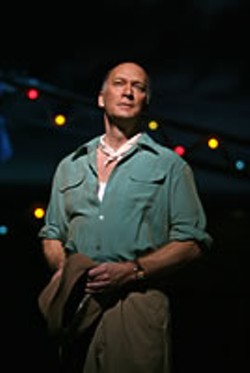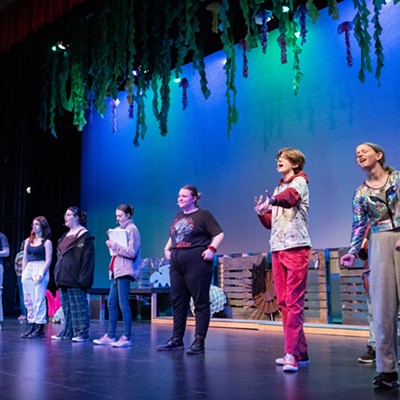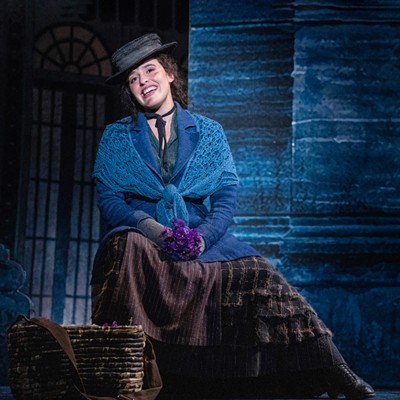Thursday, October 7, 2010
'South Pacific' review
(South Pacific is at the INB Center through Saturday, Oct. 9. See our preview here.)
OVERVIEW: This is a major American musical brought into the here and now. David Pittsinger’s regal dignity and operatic voice don’t seem out of place: Emile is a creature apart, after all. Michael Yeargan’s sets, Donald Holder’s lighting, Scott Lehrer’s sound -- so this is what it can be like; this is what wins Tonys. Bart Sher’s restrained, understated direction. We’ve all seen poor South Pacifics; this one makes up for all of them. This is how it should be done. (If you don’t read anything else, read (7:45) on Pittsinger’s voice and (10:12-10:14) on Bart Sher’s emotional wallop of a directing choice near the end.)
7:31 pm, Wednesday night at the INB Center -- The overture fires up, and while it may not be as completely thrilling as advertised, you can hear the richness and the difference: a full horn section, doubled flutes, lush strings. (My daughter, 14 next week, leans over to say that the tropical set reminds her of The Jungle Book.)
7:34 pm -- Emile’s kids are cute in sailor suits for “Dites Moi.” That ocean behind them looks real. Even the butler is black: first hint of the show’s race-consciousness.
7:36 -- Jokes over hicks from the sticks, not “stick” -- corny but still fun. Kristie Kerwin as Nurse Nellie Forbush isn’t overdoing it: She may be complaining about all the mud now, but you can tell that there are white gloves and country clubs in her Arkansas past.
7:39 -- “A Cockeyed Optimist.” Music underscores the conversation before the break-out-into-song moment, making it less obviously artificial and hokey. To all those who discount musicals for their artificiality: An orchestra of this size (26 musicians? 29?) allows for underscoring, as in a movie -- and we don’t jump all over that as obviously phony. We just accept it; it’s part of movies. ---
As Emile, David Pittsinger has great dignity onstage: thrust chest, big strides like Mufasa in Lion King, regal. Kerwin isn’t swirling about like Gidget -- it’s all in the signing and the acting, not the blocking or in exaggerated gestures.
7:42 -- Emile leans in for a kiss that never connects: the first of many restrained-passion moments, and all the sexier for it. “Twin Soliloquies”: Pittsinger’s operatic voice fits Emile, who’s refined, reserved, and very French. He teaches Nellie how to swirl her cognac. The two lovers are back to back, then face to face -- Bart Sher opts for simple blocking, letting the crescendo wash over you. That’s where the emotion is. Pittsinger’s a treat -- the only person ever to sing a role on Broadway and at the Met Opera on the same day -- and he filled in for Paolo Szot on Broadway in this role, on and off, for three months.
7:45, “Some Enchanted Evening” -- Pittsinger’s voice is like brandy cascading over chocolate and macadamia nuts; you just want to crawl inside his baritone and take a nice, long soak in it. Kerwin, fully across the stage, smiles and puts her hand to her throat: Our response is in her joy. Everyone dreams of that moment, when The One came into view, and you just knew --
7:48 -- Lingering hand-holds; they’ll become a motif. Emile reveals his secret from the past. SP has its little Sound of Music moment, with Emile as Captain von Trapp, conducting his little chorus of not six Austrian kids but two Polynesians.
7:51 -- Bloody Mary (Jodi Kimura) learns how to yell “stingy bastard!”
7:53 -- An entire plane slides on, along with Billis’s laundry, where you can get your skivvies cleaned for a nickel. Comic business with shrunken heads and grass skirts. I’d forgotten that Billis groin-centered desire provides the set-up for Mary’s more ethereal siren song beckoning everyone to Bali Ha’i. (Would I have noticed how the black Seabees are physically segregated from the rest if reviews hadn’t mentioned it? I don’t know. Race isn’t central to my life; I’m white.)
7:56 -- “Nothin’ Like a Dame.” Choreography is strenuous, athletic, almost violent in places. These guys need to get their ya-ya’s out; they are seriously horny. Sailors are cartwheeling, being held upside-down, doing helicopter arms, mocking the come-hither gestures of women. Billis (Timothy Gulan), center stage, cups his hands over imaginary ta-ta’s, then jerks his elbows back violently. The sailor caps of two guys being given noogies conveniently become breasts to fondle. The number ends with sailors sprawled all over in the moonlight -- atop airplane wings, on sand dunes. They’re exhausted, spent, post-coital.
8:03 -- Lt. Joe Cable (Anderson Davis) shows up in his aviator jacket. (I interviewed him for half an hour by cell phone while he walked the streets of Pittsburgh, then was able to use only two quotes from him, because of space limitations.)
8:05 -- “Bali Ha’i.” You can hear the harp and strings. Kimura doesn’t make it alluring or romantic; in a show filled with stellar voices, hers pales by comparison, and the song suffers. She gives Mary a limp, though, which is an interesting choice. She tries to lure Cable with supplicating arms, but he sits, contemplative, smoking. And then comes the postcard moment for Holder’s lighting: the dual-volcano island, which we can barely make out -- it’s been swathed in low-lying clouds -- emerges; it looms. A remarkable effect. Billis tries to lure Cable with visions of coconut-liquor-fueled sex party over on the island,
“where everybody gets to know each other .. really well.”
8:15 -- Slats come down for a front-of-curtain scene: Cable nixes Billis’s launch idea. Soon Nellie is being asked to spy on Emile.
8:23 -- Joe and Nellie for “My Girl Back Home,” the number that was restored to the show and moved from Act Two to here. Joe may be a little more worldly than her. (Davis and I discussed the backstory he concocted for Cable -- but he wouldn’t divulge the name of the girl back in Philadelphia. He wanted, he said, to keep that a secret.)
8:28 -- You shoulda seen the delighted, open-mouthed stare of my teenage daughter when two of the Seabees emerged from makeshift showers, clutching towels to their private parts but butt-naked for all to see as they scampered offstage.
8:29 -- Towel-swipes for “I’m Gonna Wash That Man ..” Costumer Catherine Zuber, also a Tony-winner, has the women’s chorus in bathing attire in reds and russets and rust colors, but Nellie in turquoise (I think; I’m color-deficient) -- but interesting that Emile will soon stride on in plantation owner’s hat, Indiana Jones pants and boots .. and a maroon (or thereabouts) shirt, as if he, too, were to be kept visually separate from Nellie at this point. The girls do the jitterbug as Nellie showers; some smoke cigarettes, some cavort, some suggest a quick sexual position. Towel-throw, laughter, big finish!
8:39 -- reprise of “Some Enchanted Evening.” The billboard moment: Emile embraces her from behind and croons as she turns her face up and around to gaze at him longingly. Overcoming differences, that’s the theme -- we all face differences of age, race, culture, politics, birthplace .. in a sense, Emile’s and Nellie’s struggle is our struggle, too. Not to get sappy, but .. oh, what the hell, I’ll just get sappy.
8:41 -- More than an hour into the show, and at last they kiss. And kiss again. Swimsuited gals giggle in background. The dramatic impetus for “A Wonderful Guy” handled here much more convincingly than I remember seeing it before: Nellie’s been found out: everybody knows that she was just exulting about washing him right out of her hair. So Kerwin (who was in Spamalot on Broadway and was in the San Francisco world premiere and on the cast recording of a certain Irving Berlin tuner that Spokane audiences are anticipating this upcoming White Christmas) becomes self-assertive: the energy of “A Wonderful Guy” comes out of her embarrassment and her passion. She may be as corny as Kansas, but she (and we) have learned: To really love someone, you have lose much of your self-concern and truly make it other-concern, at least for that one special someone. (Sappy again, I know. I’ll stop now.) Kerwin sings much of “Wonderful Guy” simply, just seated. Explodes for the high note near the end. Finds Emile’s hat, left behind, impulsively decides to dance with it. Shakes a leg, literally, then the other. Turns cartwheels, climbs to top of shower contraption. Thrilling finish.
8:46 -- Emile in Capt. Brackett’s office; gives his answer about the spy mission; is challenged by Cable.
8:48 -- Slats, lowered, mask swirling dry-ice fog as a “boat” conveys Billis and Cable to Bali Ha’i; the latter is lured in by seductive native girls. Liat (Sumie Maeda) suddenly, quietly appears. They each have a little French. Davis, when I talked to him, mocked this moment as “Hello.” “Hello.” “Let’s have sex.” (Which they simulate, right away.) Shirts off; sex. Bloody Mary watches in the shadows, pleased.
8:53 -- “Younger Than Springtime.” Davis says this is on page one of the tenor songbook. They sold it with playfulness -- tugging on his shirt -- melting into persuasive passion. Sher goes for push-pull-push blocking here: two young people who keep thrusting themselves like slingshots at each other.
For the Act One Finale on Emile’s terrace, Nellie and the plantation owner waltz after his fancy party. Still restrained. It looks like we’re headed for a rom-com ending here: “Cockeyed Optimist” is even briefly reprised. Nellie and Emile harmonize. He even, uncharateristically and comically, spoofs her “Wash That Man Right Out” routine with a towel of his own. But then the revelations about his wife and family. Ominous underscoring as the two of them argue. She talks fast, just wants to get out of there, finally hurries off. Pittsinger full-front and center-stage for “Never let her go!” -- ironic/romantic crescendo. End of Act One, 9:06.
Act Two, 9:24 pm -- Cast members scurry about in full view as they “prepare” for the often-mentioned Thanksgiving variety show. During the Entr’acte, a solo clarinet hints at the “Younger Than Springtime” melody, and is answered by wah-wah trumpets. Tap-dancing female chorus members, festooned with turkey feathers -- doing their routine as if they don’t exactly know it, which is not easy. Yet another impressive feature of Lehrer’s sound design: at the mic, Nellie sounded as if she were actually speaking on one of those vintage ‘40s-era, scratchy public-address systems. (Brought back memories for this boomer.)
9:33 — Billis warns Emile not to deliver the flowers to Nellie just yet — she’s been cheerful all week, so don’t go ruining her fun now, fella. Cable,meanwhile, has come down with malaria.
9:35 — I’m not quite sure what to make of “Happy Talk.” At least it’s not as creepy as it often is, with Mom pimping out her own daughter. Here, as Mary, Kimura a kind of schadenfreude: sadness over her daughter’s prospect of happiness? But I’d be eager to know what others thought of how this number was performed. The lovers nuzzle and hold hands; Mary looks on from the shadows. Brief reprise by Davis of “Younger Than Springtime” was exceptionally good: alone, distraught, bereft of his girl, preparations bustling all around him.
9:42 — Nice touch to have Capt. Brackett (played by an understudy, Christopher Carl) break down for a tearful moment while delivering his otherwise jocular, by-the-numbers speech at the mic during the “Thanksgiving Follies”: He’s aware that the young men he’s talking to are about to go off into battle. “Honey Bun” not overdone: Nellie is kicky and fun; Billis in his coconut-shell bra doesn’t camp it up for laughs. It’s joy in the context of war: sexual desire the way it should be, lovemaking as if there’s no tomorrow. The sexual banter, the guy burying his face goofily in the matron’s bosom -- it’s not just funny. It’s fun tinged with the prospect of death. When Nellie finds out who sent her flowers, it’s under a cloudy gray sky that was so beautiful, I just wanted to pause the play and stare at it for awhile.
Cable sets up “You’ve Got To Be Carefully Taught” with his remark that people are always saying that racial differences don’t matter to them — and then “everybody does their damnedest to prove it.” He scoffs at Nellie’s blatant bigotry, walks away from her. The song itself is directed right at three black sailors and two white ones, on the makeshift stage, with Cable’s back to us. Watch how subtle the blocking of the three black sailors is in this sequence.
9:55 — “This Nearly Was Mine.” Pittsinger sings it for both of them — Emile and Cable both, face front, both worried over lost loves. And with a big orchestra, during “This Nearly,” you can have the clarinet play just a couple of measures, just a hint, of “Some Enchanted Evening” — just to emphasize what Emile thinks he has lost.
9:57 — Big ovation for Pittsinger at the end of “This Nearly Was Mine.”
10:05 — War office. Crackly radio message from Emile. (No spoilers here.) He advises that “two black men” will act as guides for himself and Cable, hiding them “up in the hills” on the Jap-occupied island.
10:10 — As Nellie, sad, wanders out on a lonely beach, “A Wonderful Guy” is in the underscoring, reminding us of what she thinks she may have lost. Now she sings “Some Enchanted Evening,” accompanied in part by a solo violin. (Part of what you can do with a big orchestra.) A scene of consolation (again, no spoilers) is handled too quickly and is oddly underemphasized.
10:12 — War preparations underway; the attack on the Japanese is accelerating. Much scurrying — amazing what a director can do with 20 people and some large props to create a sense of thousands mustering for battle. (We’re supposed to think that, out where we are sitting, ten thousand men are assembling on the beach for a coordinated attack against the Japs.) Earlier, there was the comic business about Billis inadvertently creating a diversion that enabled Emile and Cable to land behind enemy lines, unseen; now, he’s showing his good side by pleading that a search party be sent out to rescue them.
10:14 — And then the evening’s most moving moment, which is all down to Sher’s direction. Slowly, almost imperceptibly, as Billis and Capt. Brackett are debating downstage, a squad of soldiers, in full combat gear, begin a slow, synchronized march right at us; they’re flanked by several women in their dress uniforms. Drumbeat, heel down; drumbeat, feet together; drumbeat, next step. This is what Davis meant in his phone interview with me about having respect for the men and women who fought in World War II.
Because as the assembled troops execute an about face, Sher reprises a snippet of the show’s good-times song: “A hundred and one pounds of fun,/ That’s my little Honey Bun!/ Get a load of Honey Bun tonight./ .. .. I am caught and I don’t wanna run./ ‘Cause I’m havin’ so much fun with my Honey Bun!” But it’s sung softly, almost like an ironic dirge of some kind, and then you realize it, then you know: They’re marching off to die. This is their memory of what it was like to laugh with friends and then, just like that, to be gone. It made me cry, then and now: the sacrifices that so many people made, just to win our freedom.
Years ago, I saw Bart Sher’s production at the Intiman in Seattle of a late and obscure Shakespeare play, Cymbeline. And it was a mockery of the play, a tasteless stew infected with way too many director’s “concepts,” an insult to the play — and if he’d been in the room, I’d have slapped him. I love that play, and he pissed all over it. BUT. But .. .. Bart Sher redeemed himself, in my eyes, entirely, with that one directorial decision to have the soldiers softly singing “Honey Bun” as they marched off to fight for a better world. Thrilling.
Segue to final scene. The talk in reviews was of how moving the final hand-holding was. Pittsinger had been directed to thrust out his hand, below table level, in an aggressive salesman’s gesture, as if to make sure that everyone in the house sees it. But that italicized the moment way too much for me. (And as a final carp: spotlights on opening night here were intrusive. In a show with such delicate and fine lighting, it seemed odd to have wavering, look-this-way, now-look-that-way lights constantly reminding us that we’re watching a show.)
But .. but .. unless you are a little kid, you will never in your lifetime see a production of South Pacific as good as this one. (And except for Pittsinger and the design elements, this is, presumably, a slight step down from what they saw on Broadway.)
Photos: David Pittsinger as Emile de Becque; photo by Joan Marcus
Anderson Davis and Sumi Maeda as Lt. Joel Cable and Liat; photo by Peter Coombs
Tags: theater , StageThrust , Image
















